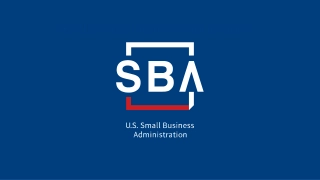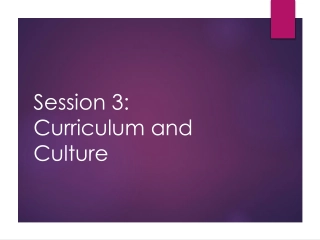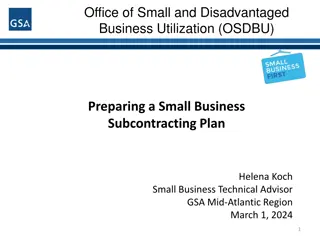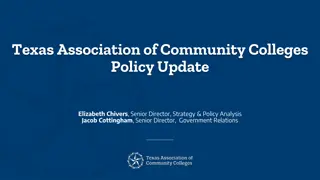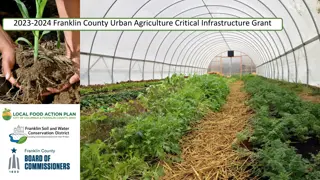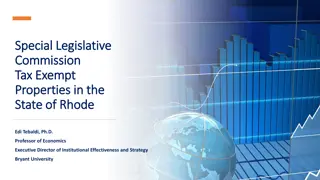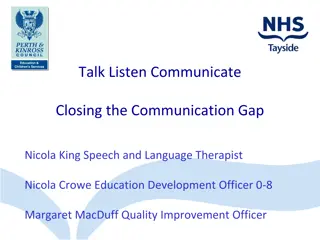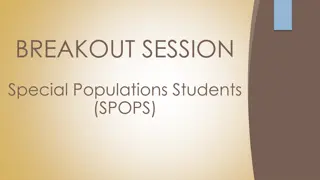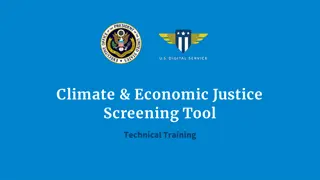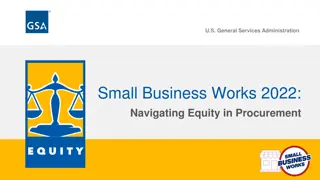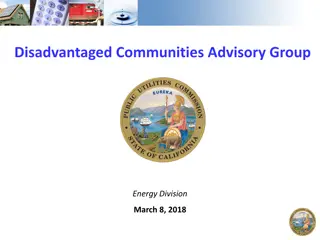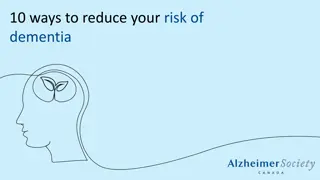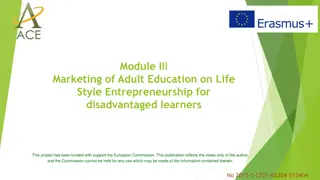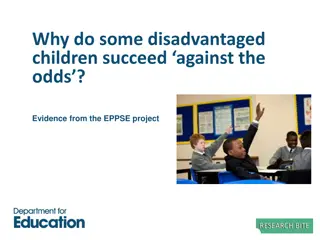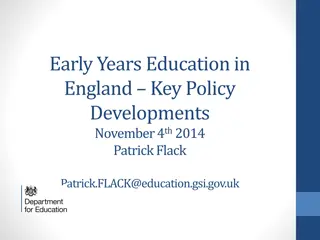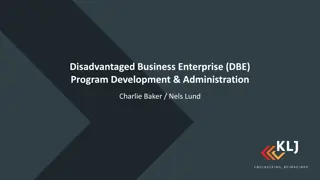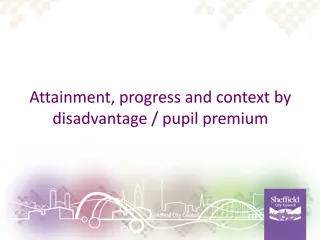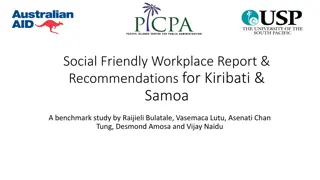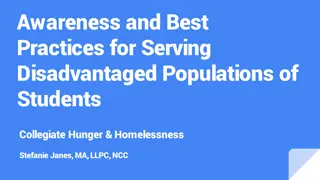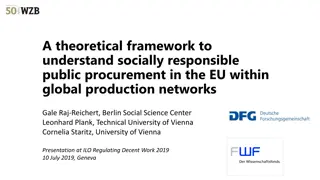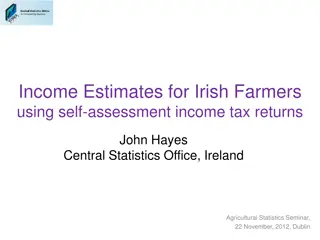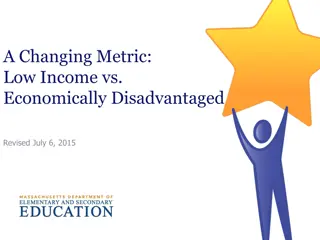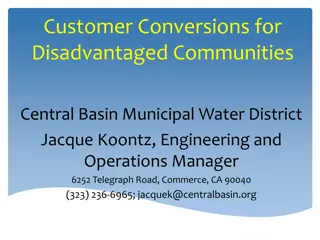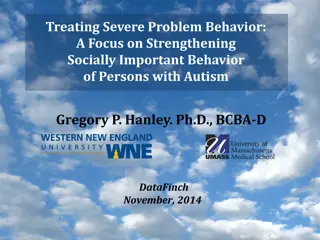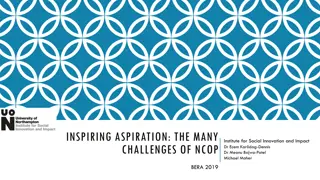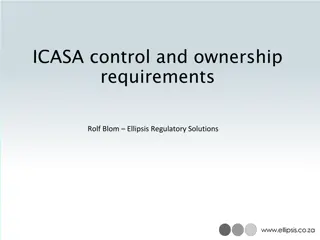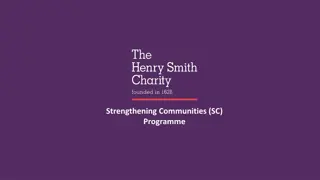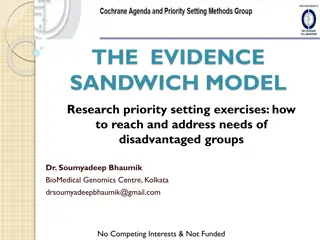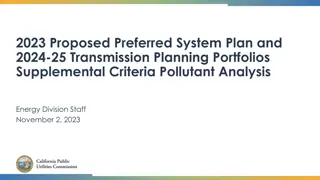SBA U.S. Small Business Administration
The SBA 8(a) Business Development Program helps socially and economically disadvantaged individuals gain access to federal contracting opportunities.
0 views • 37 slides
Session 3: Curriculum and Culture
The complex relationship between curriculum and culture, including how culture influences curriculum production, the cultural messages within curriculums, and who is advantaged or disadvantaged by the curriculum.
0 views • 17 slides
Historic Investments in Climate Action: Inflation Reduction Act May 2023
The Inflation Reduction Act (IRA) of May 2023 focuses on making significant investments in climate action to reduce U.S. emissions by an estimated 40% by 2030. This act supports disadvantaged communities, the clean energy industry, and aims to drive emissions reductions over the next decade while pa
5 views • 14 slides
Overview of U.S. General Services Administration's Office of Small and Disadvantaged Business Utilization (OSDBU)
This overview discusses the role of the Office of Small and Disadvantaged Business Utilization (OSDBU) within the U.S. General Services Administration (GSA). It highlights the advocacy for small businesses in federal acquisitions, inclusion of small businesses as contractors, and management of small
3 views • 51 slides
Office of Partnerships and Public Engagement Overview
The Office of Partnerships and Public Engagement, led by Dr. Lisa R. Ramírez, focuses on developing partnerships to address challenges in rural and underserved communities in the U.S. It connects communities with resources from the U.S. Department of Agriculture to promote solutions and provide sup
2 views • 17 slides
California NRCS Program Summary for FY2023
California NRCS Program Summary for FY2023 highlights the allocations for various conservation programs including ACEP, CSP, and EQIP. Significant funding is designated for initiatives such as the Sage Grouse Initiative, WaterSMART, and National Air Quality Initiative. The General Allocation details
0 views • 22 slides
Small Business Subcontracting Plan Requirements by OSDBU
The Office of Small and Disadvantaged Business Utilization (OSDBU) outlines the essential requirements for small business subcontracting plans, including when they are mandatory, waiver procedures, and the differences between commercial and individual subcontracting plans. It emphasizes the need for
1 views • 45 slides
Enhancing Equity in Procurement: Strategies and Initiatives
Explore the importance of equity in procurement through initiatives like M-22-03 and EO 13985. Discover how federal agencies are striving to increase equitable outcomes by supporting underserved communities and small disadvantaged businesses. Learn about key definitions like New Entrant and Recent E
1 views • 18 slides
Climate Justice & Disadvantaged Communities: Environmental Issues in US EPA Region 2
Climate justice and the impact on disadvantaged communities are key environmental issues addressed by Adriana Espinoza, Deputy Commissioner for Equity & Justice in US EPA Region 2. The initiative identifies and prioritizes disadvantaged communities based on multiple criteria, including environmental
5 views • 18 slides
Overview of the Inflation Reduction Act of 2022: FHWA Programs
The Inflation Reduction Act of 2022 (IRA) establishes various programs administered by the Federal Highway Administration (FHWA) aimed at enhancing neighborhood access and equity, implementing environmental reviews, and supporting low-carbon transportation materials grants. With over $5 billion allo
1 views • 10 slides
BELA SUBMISSION.
Advocating for language inclusivity in South African education, the National Governors Association represents marginalized communities historically disadvantaged by apartheid policies. Supporting proposed amendments to the South African Schools Act, the NGA emphasizes the right to education in langu
1 views • 20 slides
Gender Equity and Social Inclusion Policy Overview
This overview highlights the Gender Equity and Social Inclusion (GESI) Policy promoted by the Department of Personnel Management in Papua New Guinea. The policy aims to ensure fair participation of disadvantaged individuals in employment and opportunities, along with social inclusion to realize the
1 views • 18 slides
Exploring the Masters of Studying MBBS in Russia
One of the foremost compelling reasons for choosing Russia as a goal for MBBS is its affordability. Compared to many Western nations, the cost of tuition and living expenses in Russia is altogether lower. This makes seeking after an MBBS degree in Russia a monetarily reasonable alternative for numer
2 views • 5 slides
Texas Association of Community Colleges Policy Update Overview
This update highlights key components of House Bill 8 focusing on financial aid for Swift Transfer, shared services, performance tier, base tier, and the Community College Standing Advisory Committee. It also discusses the state's investment in community colleges, the HB 8 funding model, and the tra
0 views • 18 slides
Franklin County Urban Agriculture Critical Infrastructure Grant 2023-2024
This grant initiative in Franklin County aims to strengthen the local food supply chain, support urban farms, and provide critical infrastructure funding to eligible organizations. With a focus on increasing food crop production and distribution while ensuring support for socially disadvantaged farm
0 views • 12 slides
Impact of Nonprofits in Rhode Island: A Comprehensive Overview
Nonprofits play a crucial role in Rhode Island, contributing significantly to the economy, job creation, and community development. They attract and retain disadvantaged communities, support the arts, provide essential services, drive economic growth, and enhance cultural awareness. In 2021, nonprof
0 views • 14 slides
Closing the Communication Gap for Child Development
Addressing the communication gap is crucial in bridging the educational disparity between disadvantaged and privileged children. The initiative focuses on enhancing language skills, adult-child interactions, and early literacy through evidence-based strategies and activities. Training sessions aim t
0 views • 28 slides
Understanding Special Populations Students in CTE Programs
Special Populations Students in Career and Technical Education (CTE) programs include individuals with disabilities, economically disadvantaged individuals, single parents, English Language Learners, migrants, homeless individuals, and more. These students may require Individualized Education Progra
0 views • 9 slides
Climate & Economic Justice Screening Tool Technical Training
This technical training focuses on the Climate & Economic Justice Screening Tool (CEJST) beta version, demonstrating its functionality, providing technical information, and explaining feedback methods. Developed in response to Executive Order 14008, this tool aims to identify disadvantaged communiti
2 views • 8 slides
Understanding the 8(a) Business Development Program and Equity in Procurement
The 8(a) Business Development Program, created by the U.S. Small Business Administration, aims to assist socially and economically disadvantaged small businesses in developing and growing. This program provides opportunities for small companies to secure federal contracts and procurement. The progra
2 views • 31 slides
Understanding Community Wealth Building for Socially Just Economies
Community Wealth Building focuses on fairer, socially just economies through progressive concepts like anchor institutions, plural ownership, and fair labor markets. It promotes broad ownership and distribution of wealth for national and international benefits, including productivity, social, and en
0 views • 28 slides
Disadvantaged Communities Advisory Group - SB 350 Related Programs and Appointments
The Disadvantaged Communities Advisory Group focuses on the implementation of SB 350 and related programs to benefit disadvantaged communities. The group prioritizes access to clean energy technologies, affordability of energy services, and maximizing economic and environmental improvements. Appoint
0 views • 11 slides
Ways to Reduce Dementia Risk
Reduce your risk of dementia by following evidence-based actions such as protecting your hearing, seeking support for depression, avoiding brain injuries, staying socially active, and taking care of your heart. Other strategies include staying mentally and physically active, maintaining a healthy di
0 views • 14 slides
Marketing Strategies for Adult Education in Entrepreneurship
This project focuses on developing marketing competences for adult educators to engage disadvantaged learners in lifelong learning and entrepreneurship training. The aim is to empower learners through effective marketing strategies and communication channels, highlighting the social and psychologica
0 views • 39 slides
Understanding How Disadvantaged Children Succeed: Insights from the EPPSE Project
Disadvantaged children often face challenges in education, but some manage to succeed against the odds. The Effective Pre-School, Primary, and Secondary Education (EPPSE) Project sheds light on the factors contributing to their success. Parents play a crucial role by actively engaging their children
0 views • 12 slides
Key Policy Developments in Early Years Education - England 2014
The early years education landscape in England underwent significant changes in 2014, focusing on providing entitlements for three- and four-year-olds, with recent extensions for two-year-olds. The government aimed to support school readiness and parental labor market access through various interven
0 views • 9 slides
Developing and Administering a DBE Program for Small Businesses
The Disadvantaged Business Enterprise (DBE) Program aims to support small businesses owned by socially and economically disadvantaged individuals. These individuals belong to various groups such as Black Americans, Hispanic Americans, Native Americans, Asian-Pacific Americans, Subcontinent Asian Ame
1 views • 16 slides
Improving Attainment and Progress of Disadvantaged Pupils in Sheffield
Attainment and progress of disadvantaged pupils in Sheffield show an improving trend across key stages, although the gaps between disadvantaged and non-disadvantaged students are not closing fast enough. Data suggests that disadvantaged pupils with low prior attainment are making better progress in
0 views • 29 slides
Benchmark Study on Socially Friendly Workplace in Kiribati & Samoa
This benchmark study by Raijieli Bulatale, Vasemaca Lutu, Asenati Chan Tung, Desmond Amosa, and Vijay Naidu focused on evaluating policy implementation in socially friendly workplace areas like child protection, gender mainstreaming, and more in Kiribati and Samoa. Researchers used various instrumen
0 views • 17 slides
Understanding Collegiate Hunger and Homelessness Among Disadvantaged Student Populations
This collection of resources sheds light on the challenges faced by disadvantaged students in terms of collegiate hunger and homelessness. It discusses the myth of meritocracy, the importance of self-awareness, and presents insights from the "Hunger on Campus Report," highlighting food security leve
0 views • 16 slides
Understanding Socially Responsible Public Procurement in EU Global Production Networks
Socially responsible public procurement (SRPP) acts as labor governance in global production networks by incorporating social criteria in procurement contracts within the EU. This paper aims to assess the potential of SRPP in global supply chain sectors like electronics and garments. The lack of reg
0 views • 20 slides
Analysis of Irish Farmer Incomes Based on Income Tax Returns
This paper presents an analysis of Irish farmer incomes in 2010 using self-assessment income tax returns from the Revenue Commissioners. The study focused on various income sources such as trading income, rental income, employment income, social welfare transfers, and pension income. The dataset com
0 views • 12 slides
A Changing Metric: Low Income vs. Economically Disadvantaged
Historical data on low-income students in Massachusetts, collected for various purposes including school nutrition, federal entitlement allocations, and research projects. The introduction of the Community Eligibility Provision (CEP) program in 2011 aimed to provide free meals to qualifying students
0 views • 14 slides
Enhancing Water Accessibility for Disadvantaged Communities through Recycled Water Conversions
Design and installation of recycled water pipeline laterals, conversion of 9 sites in 6 Disadvantaged Community locations, and expansion of recycled water use to benefit communities. Project includes outreach strategies, funding details, and program preferences aimed at reducing groundwater pumping
0 views • 10 slides
Treating Severe Problem Behavior in Autism: A Focus on Strengthening Socially Important Behavior
This document discusses a treatment approach for severe problem behavior in individuals with autism, focusing on enhancing socially significant behaviors. It outlines a Functional Assessment and Treatment Model with steps like Functional Analysis, Communication Training, Response Chaining, and Treat
0 views • 30 slides
Addressing Challenges of Disadvantaged Students Through NCOP Outreach
This research paper delves into the National Collaborative Outreach Programme (NCOP) and its impact on disengaged and disadvantaged students, focusing on parental engagement and wider social issues. Drawing on Bourdieu's cultural capital concept, the study evaluates the effectiveness of NCOP activit
0 views • 16 slides
Understanding ICASA Control and Ownership Requirements
In South Africa, the Independent Communications Authority of South Africa (ICASA) regulates the licensing framework for electronic communications services. ICASA's mandate involves establishing licensing frameworks, promoting ownership by historically disadvantaged groups, and supporting black econo
0 views • 14 slides
Strengthening Communities (SC) Programme Overview
Strengthening Communities (SC) Programme provides grants ranging from 60k to 180k over 3 years to small grassroots charitable organizations in the UK's most deprived areas. Eligible organizations must be located within or next to designated deprived areas. The program aims to support established org
0 views • 14 slides
Evidence Sandwich Model: Addressing Needs of Disadvantaged Groups
In a world of medical advancements, reaching those in resource-poor settings remains a challenge. The Evidence Sandwich Model explores ways to prioritize research, collaborate, and tackle implementation bottlenecks to deliver basic care to disadvantaged populations. Led by Dr. Soumyadeep Bhaumik, th
0 views • 18 slides
Criteria Pollutant Analysis for California's Electric Sector Planning
The analysis focuses on minimizing air pollutants and greenhouse gas emissions, with a priority on disadvantaged communities, as directed by California's Public Utilities Commission. It includes quantifying criteria pollutants within and outside of Disadvantaged Communities (DACs) for the years 2026
0 views • 15 slides
